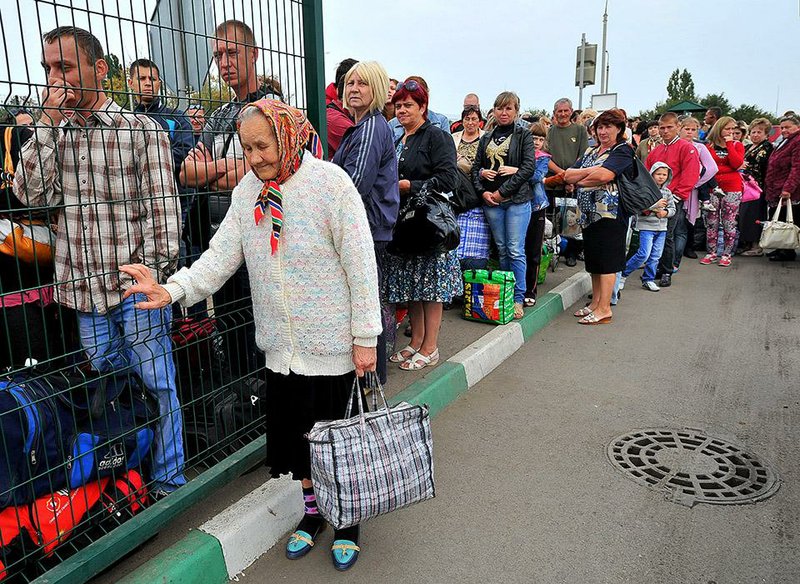The European Union and the United States moved Friday to shut down Western aid to Russian deepwater offshore and shale oil exploration in the Arctic -- deepening the range of sanctions imposed on Moscow in retaliation for its intervention in Ukraine -- despite the potential cost to Western firms such as Exxon Mobil and BP.
With twin announcements in Brussels and Washington, the new measures targeting Russia's energy development came in addition to further limits on access to U.S. and European capital markets, making it harder for Russian banks to obtain any credit in foreign capitals beyond short-term loans. The United States specifically targeted Russia's largest bank, Sberbank, for the first time.
The Europeans also banned travel by and froze the assets of 24 more individuals, including Russian lawmakers and others who have supported President Vladimir Putin over Ukraine, while the Americans blocked the assets of five Russian state-owned defense technology firms.
Also targeted was the Russian defense conglomerate Rostec and its leadership, even as its subsidiary plans to build energy plants in Crimea, the autonomous Ukrainian region that was annexed by Moscow this year in an action still rejected by the outside world.
The measures were enacted despite a fragile cease-fire between pro-Russia rebels and Ukrainian government forces that took effect last week in eastern Ukraine, and officials on both sides of the Atlantic emphasized that they could be rolled back if Russia took more significant moves to settle the violent dispute there. EU officials specifically plan to review their sanctions before the end of the month and could revise them if the peace holds.
Ukrainian President Petro Poroshenko said Friday that the pact appeared to be growing stronger by the day.
European leaders agreed last month to impose new sanctions on Russia but held off because of calls by some countries to see how the cease-fire played out. But the European Council, a body representing EU members, cited the "gravity of the situation" in a notice in its official journal announcing the measures Friday. It said it "considers it appropriate to take further restrictive measures in response to Russia's action destabilizing the situation in Ukraine."
The cumulative effect of the measures was to take aim at the heart of Putin's project to reshape and revive Russia's flagging economy through the development of Chinese-style state capitalism. The sanctions targeted a raft of financial, defense and industrial companies.
Addressing the new sanctions Friday, Putin called them "illogical" and accused Western leaders of trying to derail the peace process in eastern Ukraine, according to Russian news agencies.
"I don't even understand what these present sanctions are related to," Putin said after a meeting in Dushanbe, Tajikistan, of the Shanghai Cooperation Organization, a regional political and security group that includes Russia, China, Kazakhstan, Kyrgyzstan, Tajikistan and Uzbekistan. "Maybe someone does not like that the process has moved toward a peaceful scenario."
In trying to shut down energy development in the Arctic, the EU and the U.S. went after a pet project of Putin and a close associate, Igor Sechin, chief of Rosneft, the largest Russian oil company. It grew into a global giant in part by taking over most of the assets of Yukos, a private company whose billionaire chief, Mikhail Khodorkovsky, was arrested in 2003 and held in prison until last year.
Exxon Mobil, in partnership with Rosneft, began drilling just last month in the Kara Sea off Russia, a joint project that the Kremlin hailed as the most significant fruit of Russian-American cooperation since the end of the Cold War.
Previous sanctions banned Western companies from providing high technology for Russian deepwater, Arctic and shale exploration, but the new measures announced by the U.S. on Friday also prohibit the export of goods and services in support of exploration or production in those areas.
The U.S. measures apply not just to future contracts but also to existing interactions, and the Treasury Department gave U.S. firms until Sept. 26 to wind down current activities. The EU, by contrast, did not apply the new restrictions to existing projects in the Arctic and elsewhere in Russia.
Exxon Mobil executives said their lawyers were looking to see whether their current oil and gas production in Russia would be affected. Aside from Arctic drilling and other exploration for future production, Exxon Mobil participates in a consortium on Sakhalin Island to produce oil and gas.
"We have to look at what was issued today by the U.S. and EU and determine how it affects us," said Alan Jeffers, a company spokesman.
Russia is heavily dependent on American and European assistance in developing new energy sources. U.S. officials said the new measures were not intended to curtail current production of oil but to make clear to Moscow that its energy future would be severely curtailed unless it changed course. The officials acknowledged the moves might harm U.S. firms as well but said they fashioned them to minimize that.
"As in all of the sanctions steps we have taken," Treasury Secretary Jacob Lew said in a statement, "we have designed the actions announced today to deliver significant pressure on the targets of our sanctions while safeguarding, to the extent possible, global financial markets and the global economy."
The new round of sanctions also ratcheted up restrictions on the Russian financial sector and prohibited U.S. and European entities from issuing new debt with a maturity of more than 30 days to targeted Russian banks, energy companies and defense firms. That tightened the debt-financing limit, which was originally set at 90 days over the summer.
Information for this article was contributed by Andrew E. Kramer, David M. Herszenhorn, Neil MacFarquhar and Clifford Krauss of The New York Times.
A Section on 09/13/2014

